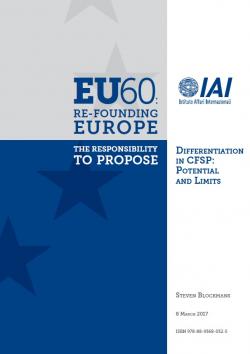Differentiation in CFSP: Potential and Limits
With or without the UK, the main factor rendering the Common Foreign and Security Policy (CFSP) ineffective remains the search for consensus among member states that pursue different (geo)political interests and socio-economic objectives. In spite of all its emphasis on a shared vision for common action and an integrated approach to policy-making, the 2016 Global Strategy on Foreign and Security Policy (EUGS) will not change this situation. However, the EU Treaty provides several under-used mechanisms to introduce more flexibility and differentiation in EU foreign policy. In addition to this, in the past few years a practice of more or less structured core groups has emerged to facilitate coordination in foreign policy-making or spearhead European involvement in international negotiations. The Visegrad Group, the E3+3 and Normandy formats are cases in point. This paper examines the potential and limits of differentiation within and beyond the treaty framework for the CFSP.
Paper prepared within the context of “EU60: Re-Founding Europe. The Responsibility to Propose”, an initiative launched by the Istituto Affari Internazionali (IAI) and the Italian Ministry of Foreign Affairs and International Cooperation (MAECI), in cooperation with the Centro Studi sul Federalismo (CSF) and in the framework of IAI’s strategic partnership with the Compagnia di San Paolo, on the occasion of the 60th Anniversary of the Treaties of Rome.
-
Details
Roma, IAI, March 2017, 13 p. -
ISBN/ISSN/DOI:
978-88-9368-032-5
Introduction
1. Treaty departures from unanimity decision-making
1.1 Constructive abstention
1.2 Qualified majority voting
2. Extension of enhanced cooperation to CFSP
3. Coalitions of member states
4. Putting the C back into the CFSP
5. CFSP+
References
Topic
Tag
Related content
-
Ricerca19/09/2016
EU60: Re-Founding Europe. The Responsibility to Propose
leggi tutto



